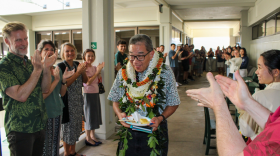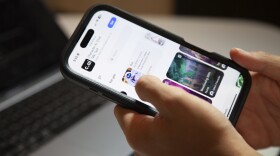The COVID-19 pandemic has kept Hawai?i?s schools closed for more than a month and families are beginning to feel the impact.
For students enrolled in Hawaiian immersion programs, school is often the only place where kids are able to practice the language.
Kona resident Leonani Hussey-Abril never doubted the decision to enroll her kids in Hawaiian immersion.

"For me, its always been my goal to have...only ??lelo Hawai?i in our household," she said.
With the coronavirus school closures, Hussey-Abril and her husband, Sheldon, who both primarily speak English, have been given a crash course in recreating that immersion experience at home.
"Even if you don?t know how to use it correctly, just try to use as much ??lelo Hawai?i as you can. I try to encourage Sheldon to do that. I scold him all the time," Hussey-Abril.
"I would be the weakest link but its motivated me to speak more," her husband said.

Their oldest daughter, Kaliko, is in the first grade at Ke Kula ?O ?Ehunuikaimalino and they?ve got 4-year-old twin girls, Lehia and Mahina, in the P?nana Leo o Kona. All three have online classes three times a week. But that?s a drastic change from when school was in session, says Sheldon.
"They would get ??lelo Hawai?i from when they get dropped off at 7:45am all the way till they get picked up at 3:45 p.m."

And that worries the Abrils, whose sole purpose of enrolling their kids in immersion was to ensure they could become fluent speakers.
Kamil Deen, chair of UH M?noa?s Linguistics Department, shares those concerns.
"We know from a lot of the research done in our own department that when children are removed from a language learning context, especially a minority language like Hawaiian here in Hawai?i, they begin to lose the language very, very rapidly."
Deen, who specializes in childhood language acquisition, says without that sustained exposure to ??lelo Hawai?i, children are losing out on more than just new vocabulary.

"If everything in their environment is English, and they?re getting Zoom for an hour a day in Hawaiian, they?re really not going to be interested in it. If children get a sense that the language is not important and is not going to be useful to them in the future, then there?s no reason for them to acquire it."
And that is why efforts being made by immersion parents like the Abrils matter, says Hawaiian language advocate N?maka Rawlins.
"No ka mea ?ike ke keiki i ka mea nui o ka ??lelo Hawai?i i ka makua. He ?ano makakoho no ke keiki kekahi l? ke nui a?e e ?ike ?auane?i ?o ia i ke komo o ka ?ohana i loko, ke k?ko?o i ka ??lelo Hawai?i."
She says the child will see how important Hawaiian language is to the parent if it's a priority. And that child will grow up knowing the family was part of the movement to support the Hawaiian language, she said,
The COVID-19 pandemic has forced parents to adopt ??lelo Hawai?i in the household quicker than they otherwise would have. And that, says Rawlins, has always been the goal of Hawaiian immersion education – to get the language into the home.




